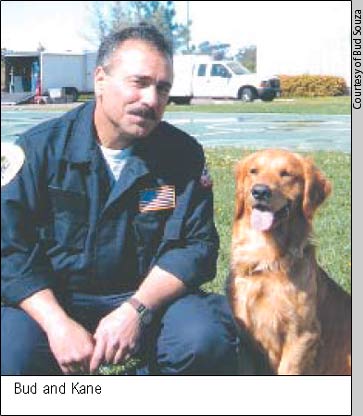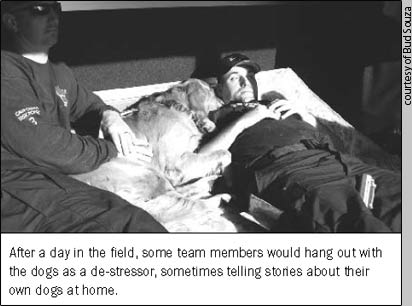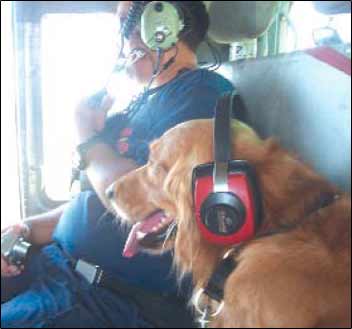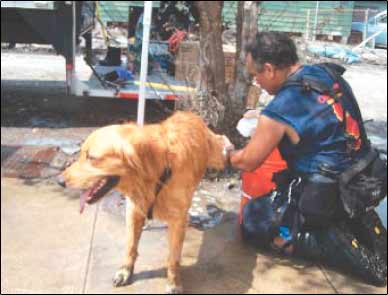November 2005
Bud and Kane to the Rescue!

North Bay search team goes to New Orleans
by Pete Alexander
Imagine that you have a dog, a wonderful, talented dog, who almost from birth could do search and rescue work. Imagine that you and your dog train every week to become wholly adept at this search and rescue work. Then, imagine that you watch a ferocious storm blow into one of our cities, and wonder when your phone will ring, and how you feel when a voice at the other end requests your presence to go to that city to help.
One person who does not have to do much imagining is Bud Souza, a retired Oakland firefighter/ paramedic, an adjunct instructor at the Assistance Dog Institute in Santa Rosa, and a member of a California Urban Search and Rescue team, one of eight in the state. Nor does his amazing dog Kane, a Golden Retriever boy, now two years, 10 months old, who received his advanced FEMA certification at age two.
Yes, the phone rang, and off these two went to join their Task Force team members. This was to be Kane’s first deployment, a trip to New Orleans, a city in great trouble after Hurricane Katrina hit in late August, 2005, and they would be gone for 21 days.
There are 26 Urban Search and Rescue teams (US&R) in the United States. These exist under the FEMA organization; FEMA sets the standards and guidelines and manages the various required certifications. Each team is made up of approximately 62 positions, including canine specialists, heavy equipment operators, structural engineers, rescue specialists, team physicians and paramedics, medical specialists, logistics people, team managers and planners.

US&Rs respond to disasters, both natural and man-made. The primary function of each team is to locate live humans while ignoring those who are standing around and the deceased while performing a search.
Practice saves lives
Bud Souza and other members of their team train "all the time, and on their own time," according to Bud. They do not get paid until they are deployed. Where do they train for such duty? Wheeler Zamaroni Landscaping and Daniel Davis Recycling in Santa Rosa, the Santa Rosa Fire Department, Canyon Rock Quarry in Forestville, and Redwood Landfill in Novato all allow the team to practice at their facilities. Training takes place once a week, and it definitely pays off when there is a crisis, and effective teams are needed.
Sorry, got to run!
In Menlo Park, four tractor trailers were loaded up with supplies to support the team effort. Off the US&R went in a caravan of trucks and buses to Houston to join up with other teams, then off to New Orleans, ready to work. Bud and Kane began work almost immediately, searching homes door-to-door on "dry" days, and upper floors of houses on "wet" (flooded) days, using boats to get to the homes.
What were the conditions like? Was it really as bad as it looked like on TV? "The conditions were tough. The water was a toxic soup. There was a constant stench of chemicals (from houses, businesses and vehicles) and dead bodies," reported Bud. "One of our jobs, by the way, was to secure bodies, so they would not float away. Molds and spores were present, and almost right away I got an upper respiratory condition. After that we began wearing first HEPA-filter masks, then more sophisticated masks with cartridges, which worked better."
The dogs, unfortunately, need their noses to do their work, and they do not have the same protective gear issued to the human members of the team. However, Bud notes "As a handler, my job is to protect my dog, watch him, make sure he won’t get hurt." So the dogs are not walked through the toxic soup, instead they are used more for the "dry" rescues.
Experiences high and low
Bud and Kane’s team made 21 "evacuee rescues" (helping people who were stranded) and 3 "live rescues" (aiding people who were in grave physical danger and getting them to medical care). Bud and Kane also got to participate in a helicopter reconnaissance, where the mission was to check on the safety of occupants of a military vehicle.
They also got to meet some of the residents of New Orleans who were still there, one a 95 year-old woman, another a 70-year-old man. Both had strong spirits and a sense of humor, the man asking if the boat he was on could be directed to a nearly flooded Burger King, "Because a hamburger sounds so good right now!"
When Bud asked a New Orleans police officer who had lost his home what it felt like to lose everything you have and then have to go to work, the officer responded, "You just got to play the hand you are dealt." This was the kind of spirit they encountered so often.
Back at the bivouac
Home to the US&R was a parking lot (dry of course) where tents were set up (though most, due to the heat, slept outside), call BOO (Base of Operations). Mosquitoes were prevalent, and West Nile Virus is too, so lots of insecticide was used as a counteraction.
At the end of each day, everyone "de-conned," including the dogs. The dogs got washed thoroughly with soap, water and disinfectants. All the dogs worked really hard and got special attention at the end of the day.
The dogs on the team also provided a kind of social therapy (there were five of them, 50 all told in Louisiana and Mississippi). After a day in the field, some team members would want to "hang out" with the dogs as a de-stressor, sometimes telling stories about their own dogs at home. As one said, "Thanks, Bud, for letting me have my ‘dog fix’."
Back at the bivouac
Back after almost a full month of very difficult duty, this noble, and in this writer’s view, heroic man and dog are back to get some well-earned rest and rehabilitation in a more normal world. Bud has been getting back to his life, giving a few presentations, and enjoying all the things in life the rest of us so often take for granted.




